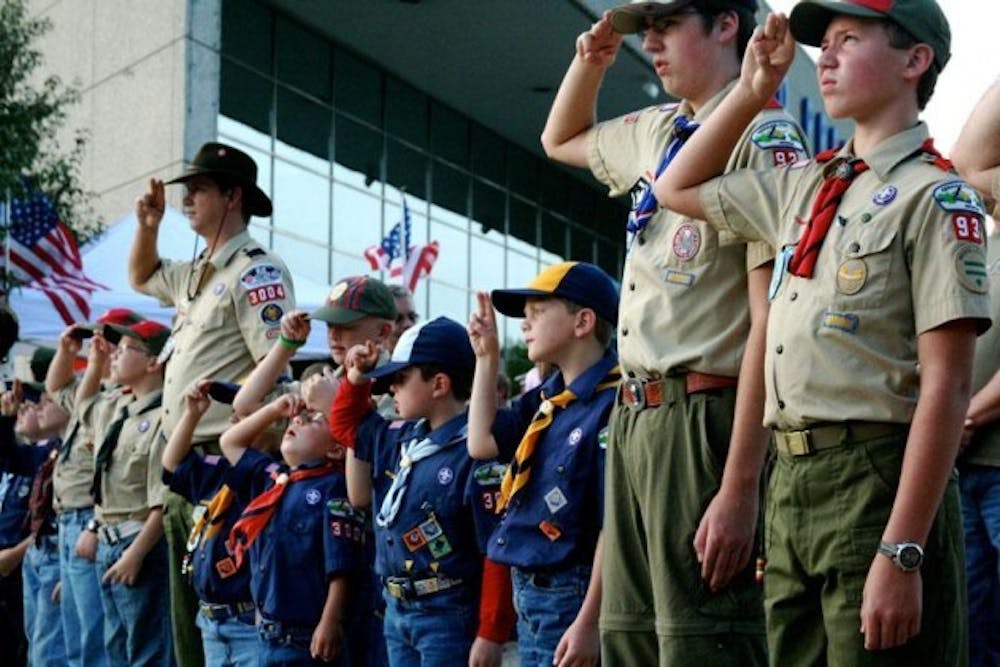When Gregory Duckworth was 13 years old, he wanted to become an Eagle Scout. During the process, Walter Andrews, his Boy Scout troop 121 leader, told him if he didn't believe in God, he would not be allowed to join. Andrews told Duckworth to lie if he wasn't religious.
On Wednesday, Feb. 6, the Boy Scouts' executive board was set to meet and vote on a proposal that would allow troop leaders of each area to set up their own policies. It was postponed until May because of the "complexity of the issue," according to the committee. If the vote passes, the troop leaders will be granted the authority to choose if openly gay men or lesbians would, for the first time in history, can join the Boy Scouts.
"I don't know why you should even have to tell the Boy Scouts your sexuality," said Duckworth, a senior English major. "I don't think that homosexuals are these sex-crazed individuals who will impose their sexuality on unwilling parties. I mean, it's not like they're going to rape you just because you're sleeping in a tent with them."
The machismo, close-mindedness, and pseudo-military aspects of the Boy Scouts are what made his experience negative, according to Duckworth.
In 2000, the Supreme Court ruled the Boy Scouts have a constitutional right to deny gay members because homosexuality goes against their "expressive message."
The proposition for the new policy suggests local troop leaders have authority over their own rules and regulations. In the 2000 Supreme Court case, "Boy Scoutsof America v. Dale,"the Boy Scouts argued, "A society in which each and every organization must be equally diverse is a societywhich has destroyed diversity."
James Ingram, a sophomore political science major andcommunication director for the College Republicans, believes the original ban is constitutional in that the organization should have the right to decide what kind of policy it upholds.
"What they're saying is that if they allowed homosexuals to join against the will of the Boy Scouts, it would affect the message that they're trying to portray within the organization," Ingram said. "They don't promote homosexuality and they shouldn't have to if they don't want to."
Completely lifting the ban would be detrimental to the Boy Scouts because the faith-based groups that help fund the organization would no longer do so, according to Ingram.
Faith-based groups financially support approximately 70 percent of scout units. Often, the religious background of those groups involves excluding gays in society.
The Boy Scouts consider it vital the scouts have the right to tie the religious beliefs of the charter into their scouting experience, according to The New York Times.
Ingram said the new policy allows for a "perfect compromise" by taking the power away from a national mandate within the organization and letting the troops choose what they want.
Michael Calliste, a sophomore political science majorand communication director for the College Democrats, disagrees. He thinks the potential change is progressive.
"I think a ban on homosexuality is not indicative of the day and age we live in," Calliste said. "I think that while they are not a vast majority of the population, they are still a significant minority party and they deserve equal rights like everyone else."
Jim Bowman, special populations outreach coordinator for Wellness Education Services and former Cub Scout, said he would like to see the policy change so people can enjoy scouting and be themselves at the same time. When he was a Cub Scout, he remembers little importance placed on sexuality.
"I don't think the Boy Scouts are about sexuality," Bowman said. "I think it's about building leaders. People have diverse identities. A lot of people are speaking to it from a religious standpoint, and there are different ways that people interpret religion. How people understand it comes down to interpretation."
Bowman said having to suppress or lie about LGBTQ identities could be negative for a person's wellbeing. He works within the LGBTQ community and is in favor of a total lift of the ban. As a gay man himself, he feels sympathy for those who won't join the Boy Scouts because of their exclusionary policy.
Duckworth, Ingram, Calliste and Bowman all share anticipation for the results of the upcoming vote.
Ingram said he is hoping for the best for the organization because it serves the community and helps children become "functioning and productive citizens."
Email: news@ubspectrum.com





